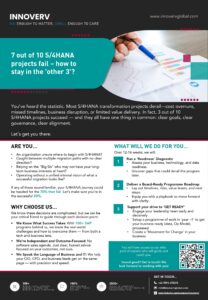
S4HANA Sponsorship – Is sponsoring an S4HANA a route to getting fired?
September 9, 2023
Transforming Your Business with Tech in a VUCA World
September 12, 2023How do we apply AI at scalein our Business?

Artificial Intelligence is rocking the world. It’s in our faces all the time: you haven’t seen anything yet, this is the end of Humanity as we know it, Machines will rule the world! AI is already having a real impact in our personal lives – from ChatGPT “ask me anything” to YouTube Music Recommendations to Deep Fake videos – AI is getting embedded into how we experience the world.
Yet when we look at the business world, it’s a very different picture. If we stop and ask ourselves: how does the organisation we work for use AI in conducting its business? It’s often a tough question to answer.
Apart from “Born Digital” businesses such as Uber or Air BNB or Tesla, the usage of AI in mainstream traditional companies is still in its infancy.
Only recently, the thrust of most AI initiatives was automation and improved productivity. The targets were typically manual tasks, blue collared jobs on the shop floor that would be taken over by robots. The shared services units of large corporations – call centres, back office GBS units focused on finance, HR, or procurement – adopted large scale usage of Automation / RPA / Bots to drive down operational costs and improved efficiency.

But is it truly “Artificial Intelligence” in the way we experience it outside corporate boundaries?
- Spotify learns from your music choices and recommends what you should listen to next; when you respond to those recommendations, it keeps learning almost to the point where it decides for you.
- ChatGPT converses with you on a topic of choice with finesse and precision that many humans will struggle to match. It’s already passing professional exams and writing complex codes.
- Social media engines are using AI algorithms to analyse a user’s behaviour, preferences, and interactions to provide personalised content, enhancing user engagement. AI already analyses users’ comments, posts, and reactions to understand their sentiments towards particular topics.
- AI is already analysing and processing images and videos to understand their content and make decisions in real time – such as for automated driving in a Tesla.
Yet such use cases are too few and far between in traditional corporates. In many of these organisations, AI value cases have been identified and experimented with, but they have largely stayed at “proof of concept” levels; or have been deployed in a pilot basis.
For example, a major beverages company uses AI to determine its product mix and optimise its order shipment but stopped after trialling it in a handful of geographical areas. And it is probably more advanced than most of its peers in AI.

While every business is different and unique, it’s not hard to see some underlying reasons for the slow scaling of AI inside corporations:
Quality of data: many businesses are plagued by poor quality data that their in-house transactional systems such as ERPs capture from users or generate based on antiquated business rules and mapping. Fragmentation of IT systems, lack of data discipline and process controls are not new problems. But when you want AI to make recommendations or take decisions based on such data, we all worry about the consequences of such moves – costly errors in execution, unhappy customers, and stranded inventory to name a few. It is therefore vitally important to have a clear plan for data quality and accuracy, ensure you have one (or as few as possible) enterprise level data repository (such as cloud hyperscaler data lakes) where you can “gather” structured and unstructured data across sources and a clear set of rules for data governance and ownership.
Skills: it’s a strange one, but in the world of tech, people who are AI whiz kids are not the ones who typically understand complex corporate business processes or systems such as SAP or Salesforce. On the other side of the fence, very few of the more traditional ERP experts understand how to build game changing AI Capabilities into core systems. There is value in the intersection, it’s just not enough talent yet available that can straddle both worlds. Doesn’t help that every SaaS provider claims to be AI-fying their apps on their proprietary platforms and these are often hard to integrate for end-to-end business processes to work smoothly (such as Market to Cash).
Ethics, regulations, and privacy issues often prove significant hurdles to overcome and while progress is being made, it’s not yet at a tipping point.
Strategic Clarity: very few businesses have yet been able to articulate a clear strategy for AI, often due to lack of understanding of its impact on their industry; due to fears of cannibalising their existing business; or due to cultural resistance in the workforce, caused by the perception (or reality) of machines taking over human jobs en masse.
Given these difficulties, where do we see AI inside businesses going in the near term?
Our view is there are some clear, emerging spaces where AI will have immediate impact inside large, complex businesses that have put in place actions to manage some of the challenges we have talked about above.
- Intelligent micro-decisions: AI algorithms embedded inside business processes will increasingly be used to make automated decisions (based on verified rules, algorithms and with embedded machine learning capabilities) to speed up outcomes, free up humans and make more accurate decisions. A large global multi category consumer company already uses AL / ML capabilities in its Supply Chain processes to process blocked orders and invoices, allocate cash and stocks and manage replenishments. Up to certain thresholds, AI itself makes the decision, but beyond it (i.e. when business impact is significant) it makes recommendations for humans to confirm. Such validations help the machine to learn and improve; the machine / human decision-making thresholds keep getting higher and higher. Currently 1 million of such micro-decisions are made by the AI algorithm every month for this company and it’s only expected to grow.
- Process Orchestration: Another interesting, if often underestimated use-case comes from the new “hub and spoke” application architecture that most businesses now are adopting in keeping with the movement to digital / cloud. A thin-core ERP (as opposed to a wall-to-wall monolithic old school ERP instance) connected to specialised Cloud based best of breed SaaS solutions now form the bull work of this application architecture, which is prevalent now across most industries. While there are obvious upsides to this landscape such as modularity, best in class functionality, and multi-cloud tenancy, a less-talked downside is the challenge of making end to end business processes flow across these application silos given the lack of industry and data standards. Many companies are being forced to create internal “Global Data Services” hubs to ensure business keeps running and sales orders, purchase orders, goods movements, invoices et el don’t get stuck in between the spokes and the hub. If these GDS hubs are created with AI built in ‘at birth’, companies will save themselves major grief down the line as the self-learning AI machine will be able to direct traffic and clear out error and exception logs through millions of such transactional flows.
- Gen AI as the Knowledge Worker: We all now know about “Generative AI” and “Large Language Models (LLM)”. Over the past year, these technologies have caused eyes to pop into the business world. Suddenly AI isn’t a “blue collar threat”, it’s coming after “white collar”, creative work. Nowhere is this truer than in industries such as professional services which rely on extensive workforces engaged in data gathering, research, analysis, coding, and articulation. Gen AI is already capable of analysing data, drawing conclusions, conducting testing, writing code, devising logic, and producing recommendation papers that are 60-70% fit for purpose – and that too at a click of a button. As the data sets that Gen AI machines get ingested with get richer, the potency of this capability will only increase. The implications of this are game changing for many knowledge-based industries from auditing to accounting to legal to consulting to IT services. Even for other industries such as manufacturing or consumer, pockets of knowledge work that they rely on (such as market analysis, product design etc.) will have significant impact in the near term. And to think that this technology is still in its infancy!
- Human-digital interface: many organisations have spent millions on cloud and digital technologies over the past decade. Yet when you ask the leaders of those businesses if they have got the returns they expected out of such investments, the answer at best is “not quite”. The gap very often is not the technology itself but its adoption by the employees and collaborators. AI can help in the same way that it helps social media platforms hyper personalise their platforms for us in our personal life, nudging us to surrender our own data willingly to them and then keep on going back to their apps repeatedly. The same techniques and technologies, applied with sophistication to our workforces, can result in significant uptake in adoption of business cloud and digital technologies inside an organisation. Case in point are AI boutiques like WorXogo (WorXogo.com) – an “AI Nudge coach” – and other similar ideas that when applied creatively can unlock a lot of value. INNOVERV’s Business Change team majors on such “cross over” ideas from social media to corporate environments to drive exponential increase in adoption of digital / cloud technologies.
In summary, we are at the very start of the “AI for Business” journey and there will be winners and losers no doubt over the next decade. However now is the time for organisations to ‘Get Ready’, get your ‘data act’ together, organise your teams to be agile and get some of the smart AI use cases we talk about above embedded into your operations. INNOVERV is happy to help you wade into the exciting new ‘AI for Business’ universe.




